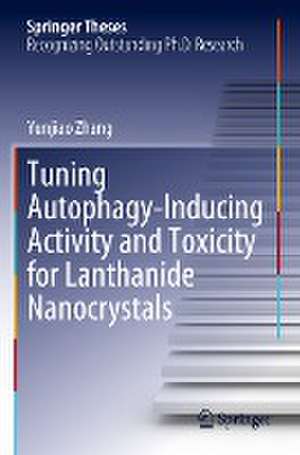Tuning Autophagy-Inducing Activity and Toxicity for Lanthanide Nanocrystals: Springer Theses
Autor Yunjiao Zhangen Limba Engleză Paperback – 10 ian 2023
| Toate formatele și edițiile | Preț | Express |
|---|---|---|
| Paperback (1) | 993.29 lei 6-8 săpt. | |
| Springer Nature Singapore – 10 ian 2023 | 993.29 lei 6-8 săpt. | |
| Hardback (1) | 999.14 lei 6-8 săpt. | |
| Springer Nature Singapore – 9 ian 2022 | 999.14 lei 6-8 săpt. |
Din seria Springer Theses
- 18%
 Preț: 997.88 lei
Preț: 997.88 lei -
 Preț: 389.88 lei
Preț: 389.88 lei - 15%
 Preț: 646.94 lei
Preț: 646.94 lei - 18%
 Preț: 943.43 lei
Preț: 943.43 lei -
 Preț: 399.29 lei
Preț: 399.29 lei - 18%
 Preț: 944.99 lei
Preț: 944.99 lei - 15%
 Preț: 636.80 lei
Preț: 636.80 lei - 18%
 Preț: 941.05 lei
Preț: 941.05 lei - 15%
 Preț: 643.16 lei
Preț: 643.16 lei - 15%
 Preț: 642.68 lei
Preț: 642.68 lei - 18%
 Preț: 1103.62 lei
Preț: 1103.62 lei - 20%
 Preț: 558.82 lei
Preț: 558.82 lei - 18%
 Preț: 1112.30 lei
Preț: 1112.30 lei - 18%
 Preț: 944.19 lei
Preț: 944.19 lei - 18%
 Preț: 1109.92 lei
Preț: 1109.92 lei - 18%
 Preț: 1217.27 lei
Preț: 1217.27 lei - 15%
 Preț: 640.06 lei
Preț: 640.06 lei - 15%
 Preț: 636.45 lei
Preț: 636.45 lei - 15%
 Preț: 640.06 lei
Preț: 640.06 lei - 15%
 Preț: 640.88 lei
Preț: 640.88 lei -
 Preț: 389.70 lei
Preț: 389.70 lei - 20%
 Preț: 563.89 lei
Preț: 563.89 lei -
 Preț: 393.35 lei
Preț: 393.35 lei - 15%
 Preț: 637.93 lei
Preț: 637.93 lei - 15%
 Preț: 641.85 lei
Preț: 641.85 lei - 18%
 Preț: 1225.94 lei
Preț: 1225.94 lei - 20%
 Preț: 551.36 lei
Preț: 551.36 lei - 18%
 Preț: 1229.10 lei
Preț: 1229.10 lei - 15%
 Preț: 639.25 lei
Preț: 639.25 lei - 18%
 Preț: 999.45 lei
Preț: 999.45 lei - 15%
 Preț: 640.06 lei
Preț: 640.06 lei - 18%
 Preț: 1220.45 lei
Preț: 1220.45 lei - 18%
 Preț: 1116.26 lei
Preț: 1116.26 lei - 18%
 Preț: 1110.72 lei
Preț: 1110.72 lei - 18%
 Preț: 1000.87 lei
Preț: 1000.87 lei - 18%
 Preț: 891.17 lei
Preț: 891.17 lei - 15%
 Preț: 640.06 lei
Preț: 640.06 lei - 5%
 Preț: 1154.07 lei
Preț: 1154.07 lei - 15%
 Preț: 635.96 lei
Preț: 635.96 lei - 15%
 Preț: 640.88 lei
Preț: 640.88 lei -
 Preț: 387.20 lei
Preț: 387.20 lei - 18%
 Preț: 1109.92 lei
Preț: 1109.92 lei -
 Preț: 385.25 lei
Preț: 385.25 lei -
 Preț: 385.25 lei
Preț: 385.25 lei - 18%
 Preț: 1112.30 lei
Preț: 1112.30 lei - 18%
 Preț: 999.45 lei
Preț: 999.45 lei -
 Preț: 386.99 lei
Preț: 386.99 lei - 15%
 Preț: 637.13 lei
Preț: 637.13 lei - 20%
 Preț: 554.20 lei
Preț: 554.20 lei - 20%
 Preț: 555.57 lei
Preț: 555.57 lei
Preț: 993.29 lei
Preț vechi: 1211.33 lei
-18% Nou
Puncte Express: 1490
Preț estimativ în valută:
190.08€ • 196.39$ • 158.12£
190.08€ • 196.39$ • 158.12£
Carte tipărită la comandă
Livrare economică 19 martie-02 aprilie
Preluare comenzi: 021 569.72.76
Specificații
ISBN-13: 9789811681684
ISBN-10: 9811681686
Pagini: 156
Ilustrații: XV, 156 p. 78 illus., 66 illus. in color.
Dimensiuni: 155 x 235 mm
Greutate: 0.25 kg
Ediția:1st ed. 2022
Editura: Springer Nature Singapore
Colecția Springer
Seria Springer Theses
Locul publicării:Singapore, Singapore
ISBN-10: 9811681686
Pagini: 156
Ilustrații: XV, 156 p. 78 illus., 66 illus. in color.
Dimensiuni: 155 x 235 mm
Greutate: 0.25 kg
Ediția:1st ed. 2022
Editura: Springer Nature Singapore
Colecția Springer
Seria Springer Theses
Locul publicării:Singapore, Singapore
Cuprins
Introduction.- Phage display identifies a specific high-affinity binding peptide RE-1 for lanthanide (LN) nanomaterials.- RE-1 forms a stable coating layer on the surface of upconversion nanoparticles / nanocrystals (UCN).- Reduction of UCN sedimentation and nanomaterial–cell interaction by RE-1 coating.- RE-1 coating abrogates autophagy induction and toxicity for UCN in vitro and in vivo.- Enhancement of cell interaction and autophagy induction by coating with RE-1-RGD.-Conclusion and prospect.
Notă biografică
Textul de pe ultima copertă
This thesis presents a simple, yet highly effective surface engineering solution that uses non-covalent binding peptides to control the autophagy-inducing activity of nanomaterials and nanodevices. The author presents RE-1, a short synthetic peptide that sequence-specifically binds to lanthanide (LN) oxide and upconversion nanocrystals with high affinity, which was discovered using an innovative phage display approach. RE-1 effectively inhibits the autophagy-inducing activity and toxicity of these nanocrystals by forming a stable coating layer on the surface of the nanoparticles, and by reducing their sedimentation and cell interaction. RE- 1 and its variants provide a versatile tool for tuning cell interactions in order to achieve the desired level of autophagic response and are useful for the various diagnostic and therapeutic applications of LN-based nanomaterials and nanodevices.
Caracteristici
Nominated as a distinguished doctoral dissertation by the University of Science and Technology of China Describes new short synthetic peptide that sequence-specifically binds to lanthanide (LN) oxide based nanocrystals Demonstrates use of binding peptides to control the autophagy-inducing activity of nanomaterials and nanodevices Presents versatile tool for in vivo diagnostic imaging and therapeutic applications
